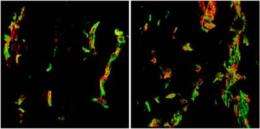Protein that helps tumor blood vessels mature could make cancer drugs more effective

Since anti-cancer drugs are carried to tumors by the bloodstream, abnormal blood vessel development can hamper delivery. In a paper published Aug. 14 in Cancer Cell, researchers at Sanford-Burnham Medical Research Institute found a molecule that promotes tumor vessel maturation. This discovery could be used to help tumor-killing therapies more effectively reach their targets.
To survive, tumors need blood supply to provide them with nutrients and oxygen. To get that supply, cancer cells stimulate new blood vessel growth—a process called tumor angiogenesis. Many attempts have been made to inhibit this process as a means to choke off tumors. But tumor angiogenesis can be sloppy, resulting in immature and malformed blood vessels. Since anti-cancer drugs are carried to tumors by the bloodstream, abnormal blood vessel development also hampers delivery. What if, rather than putting a stop to angiogenesis, we could help tumor blood vessels mature more completely, so tumor-killing therapies could more effectively reach their targets? This counterintuitive concept was proposed several years ago, but researchers lacked a way to do it. Now, in a paper published August 14 in the journal Cancer Cell, researchers at Sanford-Burnham Medical Research Institute (Sanford-Burnham) found a molecule that promotes the tumor vessel maturation process—a discovery that might provide a method for improving cancer drug delivery.
"Our finding suggests that an ability to regulate this molecule could allow us to solve various problems caused by blood vessel abnormalities, including inefficient drug delivery to tumors," said Masanobu Komatsu, Ph.D., associate professor at Sanford-Burnham and senior author of the study.
Tumor vessels: shut them down or repair them?
Previous cancer therapies aimed at tumor angiogenesis were developed with a simple hypothesis: kill the blood vessels that feed a tumor, and tumor cells starve and die. While drugs engineered to slow or halt angiogenesis have been somewhat successful, tumor cells are notoriously adept at surviving in the nutrient and oxygen-deprived environment. So, anti-angiogenic drugs are one possible weapon in medicine's arsenal against tumors, but others are needed.
Komatsu's strategy is based on a new understanding of one particular protein, called R-Ras. He and his team found that R-Ras helps blood vessels mature. The protein is found at high levels in normal, mature blood vessels. Tumor blood vessels, on the other hand, usually have very low R-Ras levels, accounting for their immature nature.
To examine the importance of R-Ras in tumor vessel maturation, Komatsu and his team tried boosting the protein in mice.
"Tumor vessels are chronically immature because they lack R-Ras," said Komatsu. "We found that if we introduce R-Ras there, we are able to normalize the blood vessel in the tumor environment—improving vessel structure and function."
Harnessing angiogenesis to improve human health
Rather than worrying that improved vessel function might help a tumor blossom, Komatsu sees it another way—using R-Ras to help tumor blood vessels mature might better enable the delivery of therapeutic drugs straight to the tumor.
Increasing R-Ras activity could also have other benefits. These include any situation where functionally mature blood vessels are needed, such as in tissue engineering when transplanted tissues need an ample blood supply. Elevating R-Ras could also be important in heart attack patients, where functional and stable new vessels are needed to re-nourish heart muscle. In brain cancer, R-Ras could help patients suffering from swelling in the brain in the area surrounding the tumor—a life-threatening situation caused by leaky blood vessels.
"Our discovery provided a better understanding of blood vessel formation process and may prompt researchers to re-think how this process may be controlled to improve human health," Komatsu said.















